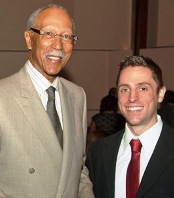
AIDS and HIV are not cured. The epidemic is not over, especially in Detroit.
That was the repeat message at today's second annual World AIDS Day Detroit Mayor's Breakfast, the kickoff event of the local AIDS and HIV awareness campaign started by Wayne State University School of Medicine student Phillip Kucab of Detroit in 2011.
The breakfast, held at the Max M. Fisher Music Center in Detroit and emceed by WJBK-TV Fox 2 Detroit reporter Amy Lange, was attended by more than 250 people, including Detroit Mayor Dave Bing and Detroit City Council President Charles Pugh, plus local and national AIDS advocates and service agencies, physicians, Detroit educators, high school students from Detroit's Denby and Cass Technical high schools, and medical students from WSU, Oakland University and Michigan State University.
Keynote speaker Kali Lindsey, director of Legislative and Public Affairs at the National Minority AIDS Council in Washington, D.C., grew up in Detroit, and graduated from Cass Tech in 1997. He believes eliminating the virus he carries is only possible through dedicated, grassroots efforts in cities with large minority populations fighting issues such as poverty, racism, lack of primary health care, drug abuse and prostitution. According to reports, some ZIP codes in Detroit have an AIDS/HIV prevalence rate of 6 percent, equal to some sub-Saharan African countries.
"You can't address AIDS without addressing the socio-economic fragility of this area," Lindsey said. "We need to roll up our sleeves and get to work. It's time to fight like hell to get this epidemic ended in the U.S."
President Obama's Affordable Care Act will provide better access to treatment for those living with HIV and AIDS in Detroit when it is implemented Oct. 1, he said. But real impact can only be made if local public and private sectors support the act and collaborate for the greater good, he added.
"Science and policy have aligned like never before. We can end this thing, but we have only a two- to three-year window to make meaningful change," he said.
"If we don't address the chaos … we don't get to zero," he added, referring to the World AIDS Day theme "Getting to zero."
World AIDS Day, officially observed Dec. 1, was established in 1988 by the World Health Organization. Kucab, a hemophiliac who grew up in the 1980s, received plenty of HIV messaging and education from health care professionals as he managed his bleeding disorder as a child and teen. By the late 1990s, medicine, with the support of the pharmaceutical industry, made major strides in successfully treating AIDS and prolonging the lives of those with HIV, thanks in part to advocacy organizations like the AIDS Coalition to Unleash Power, or ACT UP. The first federally approved drug to treat the disease was developed at the WSU School of Medicine. Because of the success, the public at large grew fairly complacent when AIDS became manageable and stopped being a death sentence.
Treatment now stops the spread of the virus, yet 50,000 people contract HIV every year, according to the U.S. Centers for Disease Control and Prevention, which released a report Nov. 27 chronicling the impact of HIV on the country's youth. An estimated 1.1 million people are living with HIV in the United States. One in four (or 26 percent) of new infections occur in 13- to 24-years-olds. About 60 percent don't know they are infected, the CDC said, and 54 percent of new infections are among young gay and bisexual African-American males.
"Letting a 16-, 17- or 18-year-old know they are HIV positive? When it's preventable? How do we bridge that gap?" asked Charles Pugh, Detroit Council president. "This is all of us, our churches, our schools, our families, our businesses, our companies."
Filmmaker Max Fisher, grandson of Detroit businessmen and philanthropist Max M. Fisher and son of AIDS activist Mary Fisher, is the World AIDS Day Detroit Honorary Host Committee chair. The Traverse City resident is shooting a documentary about what the younger generation can do to keep alive the fight for support of a still-stigmatized subject.
"I was taught growing up that this is something important. And it's important that this (generation) learns," he said.
WSU School of Medicine assistant professor and Family Medicine physician Margit Chadwell, M.D., also attended the Mayor's breakfast. Dr. Chadwell, faculty advisor and medical director of the WSU Robert R. Frank Student-Run Free Clinic, has diagnosed more than enough of the clinic's patients with HIV. Many hadn't seen a primary care doctor in 10, 15 or even 20 years. Most didn't know they were at risk for contracting the virus. Today's event was a reminder that the fight for these patients isn't over, she said.
"Coming together is good," she said. "This brings a lot of awareness - so that we don't forget about it."
Detroit Mayor Dave Bing was among the mayors in attendance, and acknowledged a lack of his own awareness.
"Being a part of this is a beginning for me. I need to be educated. I'm concerned, I am supportive, and I am a phone call away," he said.